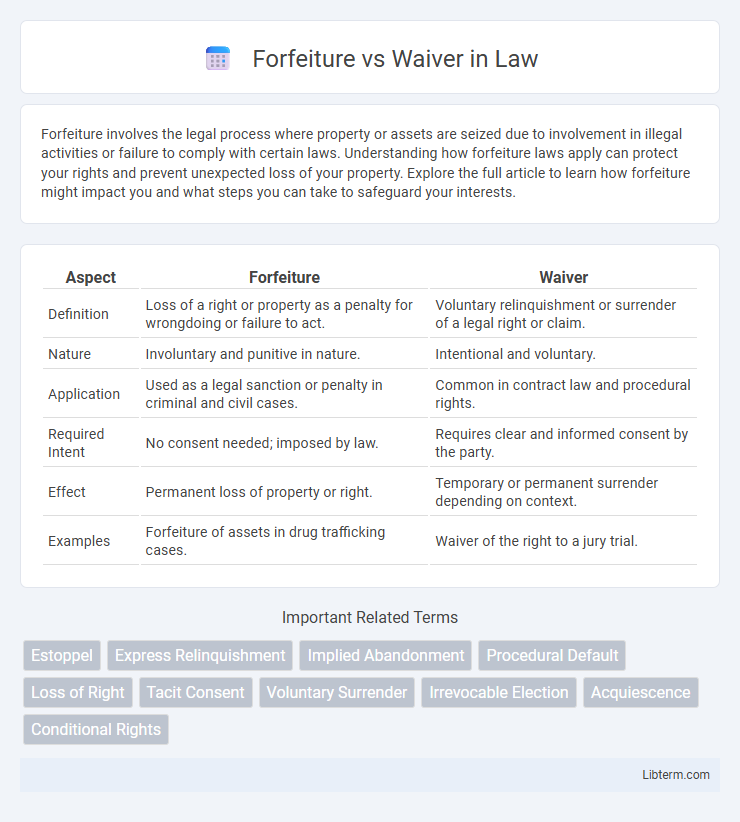Forfeiture involves the legal process where property or assets are seized due to involvement in illegal activities or failure to comply with certain laws. Understanding how forfeiture laws apply can protect your rights and prevent unexpected loss of your property. Explore the full article to learn how forfeiture might impact you and what steps you can take to safeguard your interests.
Table of Comparison
| Aspect | Forfeiture | Waiver |
|---|---|---|
| Definition | Loss of a right or property as a penalty for wrongdoing or failure to act. | Voluntary relinquishment or surrender of a legal right or claim. |
| Nature | Involuntary and punitive in nature. | Intentional and voluntary. |
| Application | Used as a legal sanction or penalty in criminal and civil cases. | Common in contract law and procedural rights. |
| Required Intent | No consent needed; imposed by law. | Requires clear and informed consent by the party. |
| Effect | Permanent loss of property or right. | Temporary or permanent surrender depending on context. |
| Examples | Forfeiture of assets in drug trafficking cases. | Waiver of the right to a jury trial. |
Understanding Forfeiture: Definition and Key Concepts
Forfeiture involves the loss of a legal right or property due to a violation of a law or failure to fulfill an obligation, often enforced by government action. It serves as a penalty designed to deter unlawful behavior by confiscating assets connected to criminal activity or contractual breaches. Understanding forfeiture requires distinguishing it from waiver, which is a voluntary relinquishment of a known right without coercion or legal penalty.
Defining Waiver: Meaning and Legal Significance
Waiver refers to the voluntary and intentional relinquishment of a known right, claim, or privilege, often established through explicit actions or statements. It holds significant legal importance as it bars a party from later asserting the waived right, thereby influencing the outcome of disputes and legal proceedings. Recognizing the distinction between waiver and forfeiture is crucial, as waiver involves deliberate consent, whereas forfeiture may occur due to neglect or failure to act.
Core Differences Between Forfeiture and Waiver
Forfeiture involves the loss of a right or property due to a failure to assert it timely, often resulting from neglect or inaction, while waiver is the intentional and voluntary relinquishment of a known right. In legal contexts, forfeiture is typically automatic when obligations are unmet, whereas waiver requires explicit evidence of consent or agreement. The core difference lies in forfeiture being involuntary and consequence-based, whereas waiver is a deliberate choice to surrender a right.
Legal Requirements for Forfeiture
Forfeiture requires a clear legal basis specifying the property subject to seizure, often linked to criminal activity or breach of law, ensuring due process protections are met. Courts typically mandate proof that the property is connected to unlawful conduct, emphasizing statutory compliance and proper notice to the affected parties. Failure to meet these legal requirements can result in the invalidation of the forfeiture action, safeguarding property rights under constitutional standards.
How Waiver Operates in Legal Contexts
Waiver operates in legal contexts by the voluntary and intentional relinquishment of a known right, claim, or privilege, effectively preventing a party from asserting that right in the future. Unlike forfeiture, which occurs due to neglect or failure to act timely, waiver requires a clear and deliberate act or decision, often expressed through conduct or explicit agreement. Courts typically enforce waivers when parties demonstrate informed consent, emphasizing the principle that rights cannot be waived unknowingly or involuntarily.
Common Examples of Forfeiture in Law
Forfeiture in law commonly occurs in cases involving criminal asset seizure, where property connected to illegal activities such as drug trafficking or money laundering is confiscated by the government. Another frequent example includes breaches of contract where a party loses rights or benefits due to failure to perform obligations. In contrast, waiver typically involves intentional relinquishment of a known right, such as waiving a jury trial or the right to appeal.
Instances Where Waiver Commonly Applies
Waiver commonly applies in contractual agreements when a party voluntarily relinquishes a known right, such as during negotiations where a buyer waives the right to inspect goods before purchase. In litigation, waiver often occurs when a defendant fails to assert a defense or objection in a timely manner, effectively losing the ability to raise it later. Employment law frequently involves waiver scenarios, especially when employees sign agreements waiving claims to certain benefits or rights under specific conditions.
Impact of Forfeiture vs Waiver on Legal Rights
Forfeiture results in the loss of legal rights due to failure to assert them timely, often barring parties from raising certain claims later. Waiver involves the intentional relinquishment of a known right, effectively extinguishing the ability to enforce that right in the future. The distinction significantly impacts legal strategy, as forfeiture is generally unintentional and may be remedied, whereas waiver is deliberate and typically irreversible.
Judicial Interpretations: Forfeiture vs Waiver in Case Law
Judicial interpretations distinguish forfeiture as the failure to timely assert a right, resulting in loss of that right, whereas waiver involves an intentional relinquishment of a known right, demonstrated through explicit or implicit conduct. Case law such as *Carella v. California* and *United States v. Olano* clarifies that forfeiture allows courts discretion to overlook errors, while waiver precludes any claim of error due to its voluntary nature. Courts consistently analyze the defendant's knowledge and intent to differentiate forfeiture from waiver, affecting remedies and procedural fairness in appellate review.
Practical Considerations When Choosing Forfeiture or Waiver
Choosing between forfeiture and waiver involves evaluating the specific legal or contractual context to determine the most effective method for relinquishing a right or claim. Forfeiture typically results from a failure to meet obligations, leading to automatic loss, while waiver is an intentional, voluntary relinquishment of a known right. Practical considerations include the desired certainty of outcome, potential for negotiation, and implications for future claims or defenses.
Forfeiture Infographic

 libterm.com
libterm.com